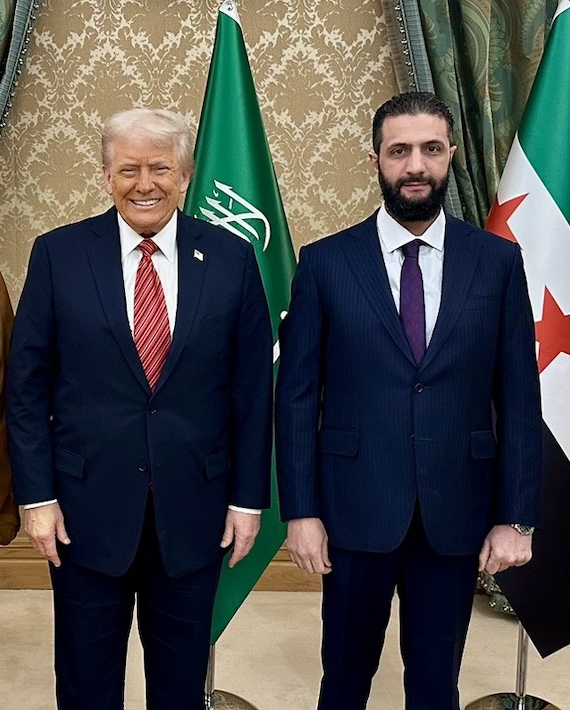By Amin Saikal, Australian National University; The University of Western Australia; Victoria University
(The Conversation) – Two prominent young Muslim figures have had an exceptional rise to power this year: Ahmed al-Sharaa in Syria and Zohran Mamdani in New York City.
While sharing a common religion, their political stories couldn’t be more different. As has US President Donald Trump’s treatment of them.
Trump has embraced al-Sharaa as a former Islamist rebel-turned-president, and invited him to the White House this week. At the same time, he has shunned Mamdani, a popularly elected mayor.
The extraordinary but different tales of al-Sharaa and Mamdani highlight the wildly unpredictable contradictions in US policy behaviour under Trump. They also underline an emerging world order that is void of rules-based principles.
Rebel with a US bounty on his head
Al-Sharaa’s elevation to the Syrian leadership has been miraculous. No one expected him to lead his radical, Sunni Islamist group, Hay’at Tahrir al-Sham (HTS), to victory last December by toppling Bashar al-Assad’s dictatorial regime.
As a former al-Qaeda commander with a US$10 million (A$15 million) bounty on his head, al-Sharaa was widely regarded in the West as a “terrorist”.
Yet, last year, he was welcomed by many in Syria’s politically and socially divided society who yearned for an end to more than a decade of bloody internal conflict and outside intervention.
Since then, al-Sharaa has traded his jihadi outfit for Western attire, presenting himself as a changed person with the aim of transforming his war-ravaged country into a stable, inclusive and united democracy.
In the past year, he has pursued broadminded domestic and foreign policy priorities. He has sought to alleviate the fears of various ethnic and religious minorities in Syria under his Sunni majority rule, though reported sectarian killings of those from the Druze and Alawite communities have prompted fears the country could splinter.
He has also sought to allay the concerns of Israel about the rise of an Islamist government in Damascus and its reputed close alliance with one of the Jewish state’s most potent regional rivals, Turkey, led by the pragmatic Islamist President Recep Tayyip Erdogan.
Faced with daunting challenges in putting Syria on a course of recovery according to his newfound vision, al-Sharaa’s leadership has been backed by the Arab League and tolerated by Israel.
The Saudi and Turkish leaders have played a critical role in lobbying Trump to treat al-Sharaa as a potential ally. During his May visit to Saudi Arabia, Trump did the unthinkable: he met with al-Sharaa. He described the Syrian leader as a “young, attractive guy” and a “tough guy” with a “strong past”, deserving of an opportunity to stabilise Syria.
He followed this by lifting sanctions on Syria and beginning the process of normalising diplomatic relations with the country. Western allies have followed suit.
During al-Sharaa’s visit to the White House this week, Trump reinforced his personal rapport with the Syrian leader with more compliments.
Transformative Democratic mayor
In contrast, Trump has shunned Mamdani since he was elected New York City’s mayor last week.
As the first Muslim and South Asian person to lead the city – as well as a self-described democratic socialist – Mamdani has indeed created history. He prides himself on pursuing a political, social and ideological agenda juxtaposed to that of Trump.
As such, Mamdani has raised the ire of Trump and many heavyweight Republicans. Trump has branded him a “lunatic communist” and condemned him as dangerous for saying in his victory speech:
[…]to get to any of us, you will have to get through all of us.
Trump has promised to cut off federal funding to New York City should the mayor-elect stray too far out of line. Some of Trump’s MAGA supporters in Congress have even called for the Uganda-born Mamdani’s denaturalisation and deportation.
What this says about Trump’s motivations
Trump stands as a neonationalist, transactional leader. He is prone to pick and choose policies if he feels they’ll bolster his primacy in American and world politics.
This explains his embrace of al-Sharaa, which is based primarily on geopolitical considerations. Trump wants to strengthen the US position in the Middle East, with the support of not only Israel but also the oil-rich Arab Gulf states and Turkey, in opposition to its chief adversary, Iran.

. Detail. President of the United States Donald Trump with President of Syria Ahmed al-Sharaa during Donald Trump’s state visit to Saudi Arabia, 13 May 2025, by Karoline Leavitt in X, White House. Public Domain. Via WikiMedia Commons
As part of this, some believe he wants Syria to join the Abraham Accords and normalise relations with Israel. Al-Sharaa has thus far ruled this out, but has not closed the door on it:
We are not going to enter into negotiation directly right now. Maybe the United States administration with President Trump will help us reach this kind of negotiation.
Trump’s eschewing of Mamdani is mostly for domestic political purposes to ensure the success of the MAGA-led Republican Party against its Democratic opponents. What really matters to him is realpolitik, not any enduring, consistent principles in the US and the world.![]()
Amin Saikal, Emeritus Professor of Middle Eastern Studies, Australian National University; The University of Western Australia; Victoria University
This article is republished from The Conversation under a Creative Commons license. Read the original article.


 © 2026 All Rights Reserved
© 2026 All Rights Reserved